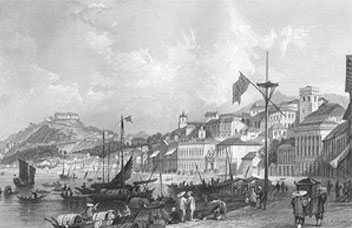- Tour Packages
- Discover Macau
- Tourist Attractions
- Heritage Sites
- A-Ma Temple
- Macau Wine Museum
- Grand Prix Museum
- Moorish Barracks
- Lilau Square
- Mandarin's House
- St. Augustine's Square
- Dom Pedro V Theatre
- Sir Robert Ho Tung Library
- Leal Senado' Building
- Senado Square
- Sam Kai Vui Kun (Kuan Tai Temple)
- Lou Kau Mansion
- Na Tcha Temple
- Section of the Old City Walls
- Mount Fortress
- Casa Garden
- Churches in Macau
- Ruins of St. Paul's
- Hotels
History – Macau

Macau became a colony of the Portuguese empire in 1557. It was lent to Portugal as a trading post but remained under Chinese authority and sovereignty. Self-administration was next achieved in the year 1840s. When the Qing dynasty and Portugal signed the Sino-Portuguese Treaty of Peking in 1887, the treaty terms made Macau a Portuguese territory again until 1999, when it was handed over to China. Macau was the last extant European territory in continental (on-shore) Asia.
Jorge Álvares (died July 8, 1521) is credited as the first European explorer to have reached China and Hong Kong by sea. In May 1513, Álvares sailed under the Portuguese Malacca captain Rui de Brito Patalim in a junk from Pegu. These were eventually consolidated at Macau which boomed with a virtual monopoly on trade between China and Japan and between both nations and Europe.
As well as being an important trading post, Macau was a center of activity for Catholic missionaries, as it was seen as a gateway for the conversion of the vast populations of China and Japan. Jesuits had first arrived in the 1560s and were followed by Dominicans in the 1580s. Due to the prosperity it was enjoying and its privileged location, other European nations began casting envious looks at Macau and plotted to seize it from Portugal. The Dutch actually tried to invade the city in 1622 but were repulsed.
As time passed by and other trading nations from the west sent missions to China, Macau became the summer residence for the Taipans (great traders) who retreated from their "factories" in Guangzhou (better known perhaps as Canton) to await the opening of the trading season.

In 1841, the British settled in Hong Kong, an island 40 miles east-northeast of Macau. Its deep-water attracted ships and trade started shifting to the Crown Colony. The economic importance of Macau declined as Hong Kong developed into one of the world's major commercial centres. Nevertheless, Macau is still regarded as an important distribution outlet for Rice, Fish, Piece Goods and other Chinese Products and enjoys an active manufacturing and exporting business, mainly in textiles, garments, toys, electronics and footwear.
Although Macau has witnessed many changes during its 440 years of existence, it has always been a stronghold of Portuguese presence and culture in the Far East. Macau has proudly flown Portugal's flag continuously even when the Motherland's throne was occupied by a foreign king, in the 17th century. When Portuguese rule was re-established, 60 years later, the city of Macau was granted the official name of:
CIDADE DO NOME DE DEUS DE MACAU, NAO HA OUTRAMAIS LEAL
(City of the Name of God, Macau, There is None More Loyal).
